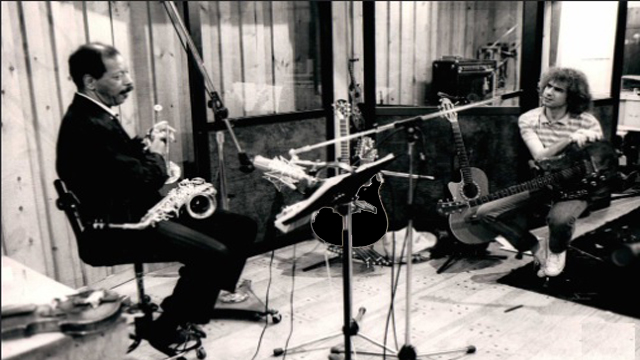For more Remembering Ornette podcasts click here

“The way Ornette and bassist Charlie Haden could listen to each other and create vast webs of implied harmony, evoking everything from blues to the most advanced counterpoint of classical western music, is one of the most impressive things I have experienced as a listener.”
In the early 1980’s I had been playing in a trio regularly with Charlie Haden and drummer Billy Higgins and Ornette had come down to the Village Vanguard during one of our New York engagements to hear us play. I think that Ornette knew that I had recorded a few of his songs here and there over the years and seemed to have a growing interest in the guitar as a potential sonic element in the music. Over the course of a few conversations, (with constant encouragement on both sides by our mutual friend Charlie) we agreed that it would be fun to get together sometime and play, which of course was thrilling for me to even contemplate.Shortly after that, I changed from one record company to another, and these conversations stuck in my mind. With one call to Ornette, one to Denardo (his son and manager,) we agreed that we should make what would become the record Song X. It became my first record for this new record company (Geffen) and a major highpoint in my life as a musician.
The weeks leading up to the making of this record were really intense, and unbelievably inspiring. In our first meeting, we agreed that we should try to do something that was unlike anything that might be expected of either of us and that we should try to develop a language and a way of playing together that was particular to this project. We began a routine that would last almost a month. We would get together every day just the two of us or sometimes with Denardo joining in on drums, and play together for as much as 10 hours at a stretch, working on tunes and ideas for the record and spending countless hours just improvising together. After a few weeks of this, we started to come to some conclusions about what other musicians would be ideal to join us.
The rhythm section of myself, Charlie and Jack Dejohnette had done a fair amount of playing together by that time (we had made a record called 80/81 a few years before that and had toured a lot, and then again as a trio). I felt that the meeting of Jack and Ornette would be exciting, and the work that Denardo was doing with electronics was fascinating to me and seemed to parallel some of what I was working on with my own guitar sound at that time. I have to admit that the thing I was most excited about was to hear Charlie and Ornette play together again. At the time of this recording it had been almost 10 years since they had been in a recording studio together.
It was an amazing opportunity to really examine Ornette’s thinking processes as well as learning a lot about improvising itself from one of the genuine living masters. But during the rehearsing and recording, and even more so on the tour that followed, I was struck by just how much sheer time and energy Ornette puts into his music. I have been accused of being a workaholic myself; known to spend countless hours practicing, working on a new project or tune or record. But in Ornette I had more than met my match. I recall on the Song X tour (all one-nighters across the States, a fairly grueling schedule) that we would check into a hotel at noon or so, Ornette would immediately go to his room and start practicing, playing right up to the soundcheck at 4 pm. He would then play nonstop all through the soundcheck (I remember at one point asking him to stop for just a few minutes so I could work on a technical thing with a volume pedal or something without having to interrupt his ideas by shouting over to the sound crew). He would then stay at the gig, and practice right up till the first note of the concert, play so beautifully (and long!) for the gig (we were averaging 2 to 2 1/2 hour sets), and then stay afterwards and play some more after the gig.
I have never seen any musician of any age with that kind of dedication and just plain stamina. Also, it was interesting to hear just exactly what he was practicing. First of all, it didn’t sound like “practicing” at all; it was more like playing itself, with an occasional pause to mine a newly discovered tributary of an idea, which when you think about it is kind of a characteristic of his on the bandstand playing as well. Also, I remember being struck by just how tuneful and songful his practicing was. I remember thinking that there were dozens of great Ornette tunes being generated by the second, and that there seemed an almost infinite supply of them in there.
In addition to being one of the giants of modern music, Ornette is one of the most gentle and soulful human beings on the face of the earth. His humor, so evident in his music, informs all aspects of his off-the-bandstand behavior as well, his music being literally a perfect reflection of the man inside. And his humility, in the face of his overwhelming accomplishments and abilities, reveals a reserve of personal wisdom that matches his gift as a musician.
However, for all the things that I have personally gotten out of listening to, playing and being around Ornette’s music, I have to say the main thing in the end that has affected me the most – and inspired me the most – is Ornette’s profound commitment to developing his own personal musical language.
The way he has relentlessly assumed responsibility for his own singular musical aesthetic may be one of the most important beacons of artistic vision and clarity of our time. He has inspired me, and by this time it must be thousands of other musicians, to answer to a standard that demands that we look into our own hearts and minds to see what we may have to offer in our own personal musical languages; if we can only muster up the courage to listen to the songs inside of us the way Ornette has.
This quality, becoming more and more rare, less and less valued in this era of conservatism and revisionism that these words are being written in, is the lasting gift that Ornette has given the music world that will provide future generations of musicians from all stylistic areas a point of reference forever. Here was a man who made his own music, his own way, with nearly unparalleled artistic success.
– Pat Metheny
From: “Ornette Coleman: His Life and Music” by P. N. Wilson (1999)
More Jazz Resources: Visit JazzontheTube.com’s video archive of over 2,000 annotated class jazz videos, the largest collection on the Internet.
And don’t forget our comprehensive, up-to-date global list of jazz clubs, jazz radio stations, festivals, and jazz education programs.






 Louis Armstrong
Louis Armstrong